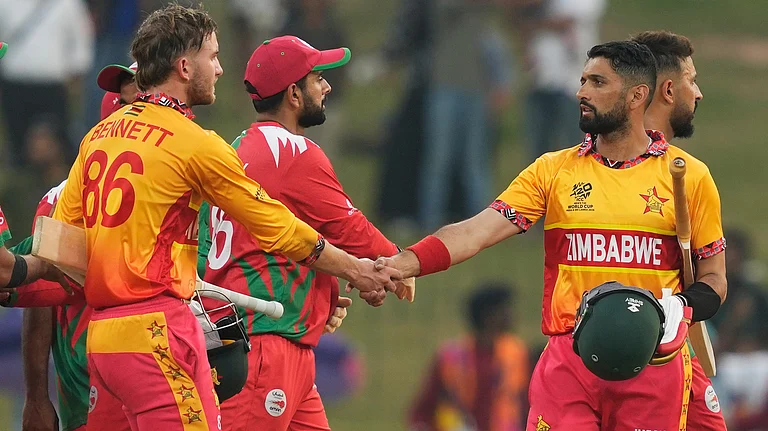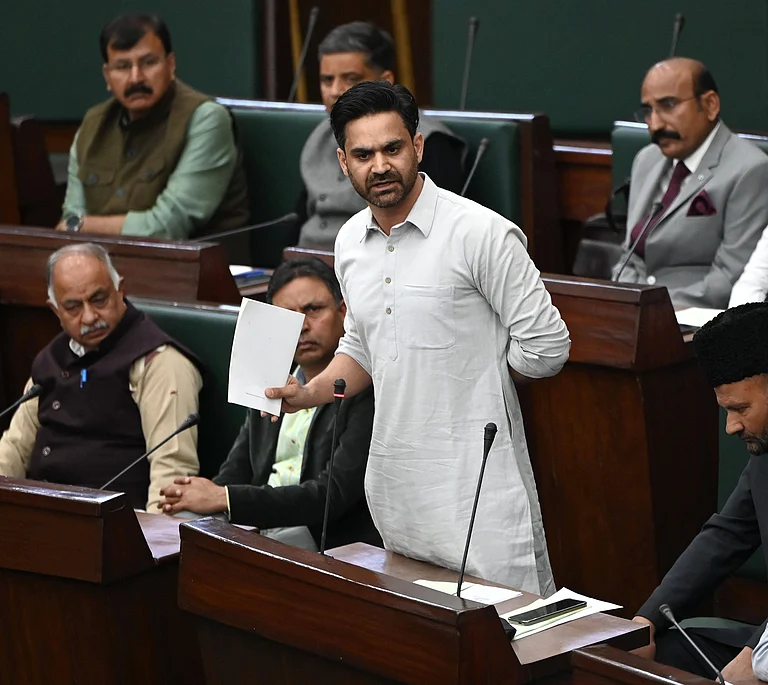Producing Barek before the two-member panel headed by Chief Election Commissioner A.K.M. Sadek, the minister declared: "He is insane and doesn't qualify to contest the election." Barek was a plant by his opponents, who wanted to discredit him personally and at the same time paint the polls as a farce. "Forgive me sir, please forgive me, I'll never do it again," implored Barek, who had filed his papers to fight the election against the minister in Gazipur constituency, about 30 miles north of Dhaka. A huge guffaw broke the sombre atmosphere and Justice Sadek, a serious, no-nonsense man, instantly can-celled Barek's nomination, saying "it's a nasty joke".
Since that day, according to Banglabazar Patrika, Barek has been missing.
"It doesn't matter whether it's a farce or caricature," says Khalilur Rahman Majumdar, who claims to have fielded candidates for all the 300 seats, of which 155 were cancelled after scrutiny. "I love contesting the elections," he says with a big grin. Majumdar is perhaps slightly better known than Barek. He stood as a presidential candidate in 1988 when, in an eerie resemblance to the present situation, Gen H.M. Ershad held a farcical, one-party election.
"Frankly speaking," says Majumdar, "I can't let this opportunity slip through my fingers. I must take advantage of the vacuum created by the Opposition boycott to get into Parliament....In a real, all-party contest my chances are nil." He gets more candid. "Yes, there's the irresistible temptation of being thrust into the spotlight. Had I not contested, do you think you would have talked to a man like me or the Ittefaq would have printed my name?" Ittefaq is the largest newspaper in Bangladesh. Majumdar, head of the Jatiya Nagarik Sanghati, a party which exists only in name, comes across as crude but sincere. However, eyebrows were raised when he vehemently denied having received any cash handouts from the governing Bangladesh Nationalist Party (BNP) for his decision to join the elections.
"I haven't got a single penny so far from them," Majumdar says emphatically. "Don't forget I was a presidential candidate. You can't expect me to behave like others who have queued up for a paltry 10,000 taka in front of (Home Minister) Abdul Matin Chowdhury's house." Gen Ershad had given him 20 lakh takas for contesting the 1988 elections, and "now they expect me to be sold for just 10,000," he says, with an air of injured pride.
Not everybody is as proud as Majumdar. Some Dhaka newspapers indirectly reported that the Siddheswari residence of Matin Chowdhury was flooded over the past week with people wanting their pound of flesh, promised in exchange for their decision to join the election. The ruling party almost landed in a spot when about 1,000 candidates—of the nearly 2,000 who filed nominations—held an impromptu meeting in front of the Election Commission. They were threatening to withdraw their candidature unless they were given their promised share in advance. Luckily for the BNP, the minister managed to stave off a crisis by hammering out a settlement with the disgruntled candidates.
But all candidates are not like Barek and Majumdar. There are some you can't laugh at. Anwar Zahid, convener of the National Democratic Alliance (NDA), is one of them. A former information minister under Ershad, he was sacked after he publicly declared that he would serve as a sweeper if his boss (Ershad) so desired. Zahid has decided to participate in the forthcoming elections to foil India's alleged attempts to subvert the democratic process in his country. The implication is that the Opposition boycott is engineered.
"A big conspiracy is under way to impose Indian hegemony on Bangladesh and we won't allow it to happen," says Zahid. He, however, doesn't elaborate on how India could persuade staunchly anti-Indian parties like the Jamaat-e-Islami and the Jatiya Party to bow to Delhi's wishes, although the Awami League, widely believed to be pro-Indian, could be thought of as susceptible. The NDA may not be a frontline party, but it can boast of a senior member who is not only known in Bangladesh but outside. Retired Colonel Abdur Rashid is the self-confessed killer of the country's founder, Sheikh Mujibur Rahman.
As Zahid and Rashid spoke at a press conference at Hotel Purbani in the Motijheel commercial district of Dhaka recently, a group of anti-election activists stormed the hotel and damaged their cars. Zahid and others left the place under police escort. To Opposition supporters and even to some independent observers, this is comedy film material.
But Abdul Mannah Bhuiyan, BNP joint secretary general and minister for food and agriculture, insists that elections are serious business. "We did our best to bring the Opposition parties to the election", he said in an interview, "but all our efforts floundered on the Opposition's stubbornness. We are bound to hold the elections as mandated by the Constitution." A key negotiator from the BNP who held several meetings with the Opposition parties, he is convinced the poll boycott was prompted by the fear of losing, especially in the Awami League's case.
"Nonsense", says Mohammad Nasim, League organising secretary and Opposition spokesman. "We said from the very beginning that we won't join until a neutral caretaker government was formed to conduct the elections. The BNP knew it would lose if the elections were held under a neutral regime."
AS both sides traded recriminations, the Election Commission deferred the elections twice, hoping for a last-minute compromise. Hopes were indeed raised on the eve of the deadline for filing nominations (January 17) when six envoys from the US, Britain, Canada, Italy, Australia, and Japan made a last-ditch attempt, shuttling between Prime Minister Khaleda Zia and Awami League chief Sheikh Hasina, to get all parties to agree. But all their efforts, which continued late into that night, were in vain. "We tried our best in the greater interest of Bangladesh," says Peter Fowler, the British High Commissioner in Bangladesh. "But the mistrust between the two sides is so deep that we couldn't do much."
Some analysts here feel it's not simply the mistrust but the personal antagonism between the two principal players, Zia and League chief Sheikh Hasina, that proved to be the main roadblock to any kind of reconciliation. With neither prepared to take the blame for the collapse of the talks, both have vehemently defended their respective stances.
In a nationally-televised speech on January 23, Zia put the blame squarely on the Opposition in general and the League in particular. "We made a lot of concessions in the hope that they would come around. It appeared they would settle for nothing short of ousting a democratically-elected government. We had no choice but to go ahead with the poll process to uphold the Constitution and maintain the democratic process," she declared. "A bunch of lies," retorts Hasina. "It's the Prime Minister's insatiable lust for power that made any meaningful negotiations impossible. But we won't let her wreck the democratic process."
It's a matter of debate whether the ruling party or the Opposition is to blame for the current crisis, but what is indisputable is that the very democracy which both sides claim to be upholding is now passing through testing times. "It's a grave situation," says Dr Kamal Hossain, who was foreign minister under Sheikh Mujib and currently head of the Gano Forum. Blaming both the BNP and the Opposition for the imbroglio, he doesn't see any credibility in the one-party election but is more worried by the confrontationist approach both sides have taken.
In fact, the confrontation has already begun. Over 50 people, including some policemen, were injured in a violent clash between BNP activists and Opposition supporters in the north-eastern Sylhet district recently. A day later, unidentified arsonists targeted an Election Commission branch office in a 12-storey Dhaka building, destroying ballot papers and documents. The incident, which came a month after a mysterious blaze in the Chittagong election bureau office, triggered fears of more such acts of sabotage.
Not that a crucial election is at stake. Khaleda Zia has already been elected unopposed. So have her 41 party members, including 12 ministers and former speaker Sheikh Razzak Ali. This, according to independent observers, has further dulled the already lacklustre February 15 polls and buttressed Opposition claims that it would be a farce.

























